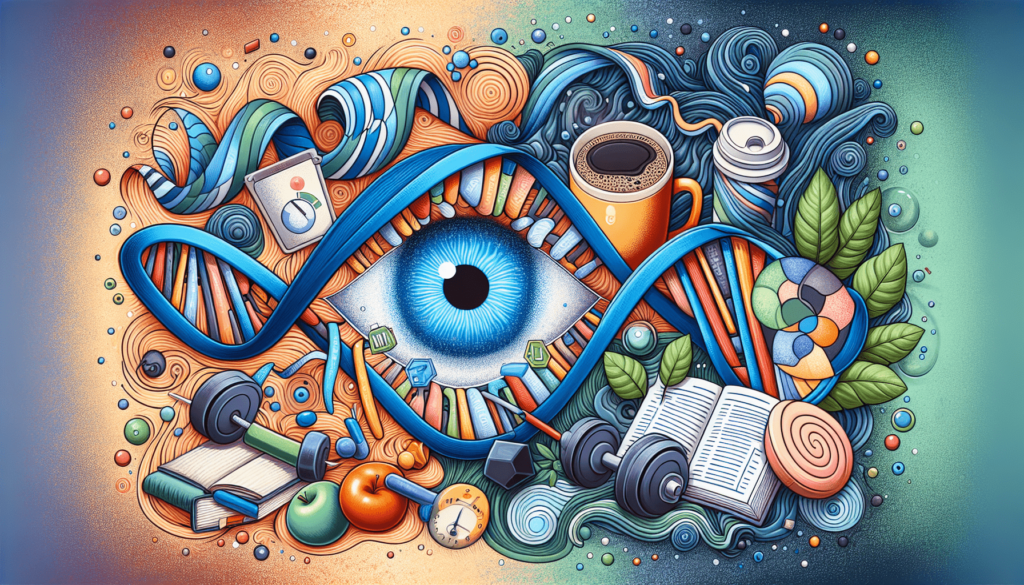Have you ever wondered why some people seem to function perfectly well with just a few hours of sleep, while others need a solid eight hours to feel rested? It’s an intriguing question that scientists have been studying for years, trying to uncover the secrets behind our individual sleep needs. In this article, we’ll explore some of the fascinating reasons why some people require less sleep than others and how genetics, lifestyle factors, and sleep patterns all play a role in determining our unique sleep requirements. So, if you find yourself tossing and turning all night, or envy those who can conquer the world on minimal sleep, read on to uncover the science behind our diverse sleep needs.

Genetics
Influence of specific genes
Genetics plays a significant role in our sleep patterns and requirements. Specific genes have been identified to have an influence on sleep duration and quality. One such gene is called DEC2, also known as the “short sleep” gene. People with this gene variant are able to function optimally on less sleep than the average individual. On the other hand, mutations in other genes, such as the BHLHE41 gene, have been associated with longer sleep durations. These genetic variations highlight the diversity in sleep needs among individuals.
Variations in sleep genes
In addition to specific genes that directly affect sleep duration, there are several variations in genes involved in the regulation of the sleep-wake cycle. For example, the PER3 gene has been found to affect individual preferences for the timing of sleep. Those with a specific variation of this gene, known as the “morning person” variant, tend to wake up earlier and feel more alert in the morning. These genetic differences contribute to the natural variation in sleep needs and preferences among individuals.
Inherited sleep patterns
Sleep patterns can also be inherited from our parents. Your biological clock, or circadian rhythm, is influenced by your genes. If your parents are “night owls” or naturally early risers, you may have a similar sleep pattern. This inherited tendency can contribute to individual differences in sleep needs and preferences. Understanding the influence of genetics on sleep can help us better appreciate and accommodate these individual variations.
Individual Differences
Natural variation in sleep needs
Just as we differ in physical features and personalities, our sleep needs also vary naturally. Some individuals require more sleep to function optimally, while others can thrive on less. It is important to recognize that there is no one-size-fits-all approach to sleep duration. Factors such as age, overall health, and individual genetics all contribute to determining how much sleep each person needs. Embracing and respecting these natural differences can lead to improved sleep quality and overall well-being.
Age-related sleep changes
Sleep needs change throughout our lifetime. Infants require around 14-17 hours of sleep per day, while teenagers typically need about 8-10 hours. As we enter adulthood, our sleep needs decrease slightly, with most adults requiring 7-9 hours of sleep. Older adults may experience changes in sleep patterns, including more frequent awakenings during the night and increased daytime sleepiness. Understanding these age-related sleep changes is crucial in ensuring proper sleep management for every life stage.
Gender differences in sleep requirements
Research suggests that there may be differences in sleep needs and patterns between genders. Women tend to have a higher prevalence of sleep disorders, such as insomnia, compared to men. Hormonal fluctuations during different stages of the menstrual cycle and during pregnancy can also affect sleep quality for women. Men, on the other hand, may be more prone to sleep-disordered breathing, such as sleep apnea. These gender differences highlight the importance of considering individual needs and addressing sleep concerns specific to each gender.
Sleep Quality
Efficiency of sleep
It’s not only about the quantity of sleep, but also the quality that matters for overall well-being. Sleep efficiency refers to the percentage of time spent asleep compared to the total time spent in bed. Higher sleep efficiency indicates better quality sleep. Factors such as a comfortable sleep environment, relaxation techniques, and optimal sleep duration all contribute to improving sleep efficiency. Enhancing the efficiency of your sleep can help you wake up feeling refreshed and rejuvenated.
Utilization of deep sleep stages
During deep sleep, also known as slow-wave sleep, our bodies undergo essential restorative processes. This includes the repair and growth of tissues, the strengthening of the immune system, and the consolidation of memories. Some individuals naturally have longer periods of deep sleep, allowing their bodies to reap the full benefits of these processes. Adequate deep sleep is crucial for maintaining physical and mental health, and individual differences in deep sleep stages may contribute to variations in sleep needs.
Amount of REM sleep
Rapid Eye Movement (REM) sleep is the stage associated with vivid dreaming and memory consolidation. Although it occurs multiple times throughout the night, the duration and proportion of REM sleep can vary among individuals. Some people have shorter REM sleep periods, while others may have longer and more intense REM sleep episodes. Changes in the amount and distribution of REM sleep can influence sleep quality and play a role in individual sleep differences.

Caffeine and Stimulants
Effects of caffeine on sleep
Caffeine is a commonly consumed stimulant that can have significant effects on sleep. With its ability to block adenosine receptors in the brain, caffeine promotes wakefulness and reduces feelings of sleepiness. Consuming caffeine, especially later in the day, can interfere with the ability to fall asleep and/or stay asleep. It is essential to be aware of your individual sensitivity to caffeine and to limit its consumption, especially in the hours leading up to bedtime.
Individual sensitivity to stimulants
Not everyone reacts to stimulants like caffeine in the same way. Some individuals may be more sensitive to the effects of caffeine, experiencing increased alertness and difficulty falling asleep hours after consumption. Others may have a higher tolerance to caffeine, requiring larger doses to experience similar effects. Understanding your own tolerance and sensitivity to stimulants can help you make informed decisions about their consumption and minimize any potential disruptions to your sleep.
Long-term caffeine consumption
Regular and excessive consumption of caffeine over an extended period can have lasting effects on sleep patterns. The stimulating effects of caffeine can persist even when consumed earlier in the day, disrupting the natural sleep-wake cycle. Long-term caffeine consumption has been associated with decreased total sleep time, increased sleep latency (time it takes to fall asleep), and reduced sleep quality. It is important to moderate your caffeine intake and consider reducing or eliminating it altogether if you experience sleep disturbances.
Physical and Mental Health
Underlying medical conditions
Various medical conditions can impact sleep quality and duration. Chronic conditions such as heart disease, respiratory disorders, and neurological conditions may contribute to sleep disturbances. Pain associated with conditions like arthritis or fibromyalgia can also disrupt sleep. Treating and managing these underlying medical conditions can significantly improve sleep and overall well-being. If you suspect a medical condition may be affecting your sleep, it is important to consult with a healthcare professional for a proper diagnosis and treatment plan.
Psychological factors affecting sleep
Our mental well-being can have a profound impact on our sleep patterns. Stress, anxiety, and depression are common culprits of sleep disturbances. Racing thoughts and heightened emotional arousal can make it difficult to fall asleep and stay asleep throughout the night. Addressing and managing these psychological factors is crucial in improving sleep quality. Techniques such as mindfulness meditation, cognitive-behavioral therapy, and stress reduction strategies can be helpful in promoting better sleep.
Impact of chronic pain on sleep duration
Chronic pain can significantly interfere with sleep. Conditions such as arthritis, back pain, or migraines can cause discomfort that makes it challenging to find a comfortable sleeping position or stay asleep throughout the night. Pain-related sleep disturbances can lead to a cycle of sleep deprivation and increased pain sensitivity. Developing strategies to manage and alleviate chronic pain, such as exercise, physical therapy, or pain medication under medical supervision, can help improve sleep duration and quality.
Lifestyle Factors
Regular exercise and its influence
Engaging in regular exercise has been shown to have positive effects on sleep. Physical activity promotes the release of endorphins, which can improve mood and reduce anxiety, leading to better sleep quality. It is important to note that the timing of exercise plays a role in its impact on sleep. Exercising too close to bedtime can increase alertness and delay the onset of sleep. Finding the right balance and establishing a consistent exercise routine can contribute to better sleep habits.
Dietary habits and sleep needs
What we eat and drink can directly affect our sleep patterns. Consuming large meals close to bedtime can lead to discomfort and heartburn, making it difficult to fall asleep. Similarly, consuming stimulating substances such as nicotine and alcohol can interfere with sleep quality. On the other hand, certain foods like tryptophan-rich foods (e.g., turkey, cheese) promote the production of serotonin and melatonin, which aid in sleep regulation. Paying attention to your dietary habits and making conscious choices can help improve your sleep.
Alcohol consumption and sleep disruption
Although alcohol can initially make you feel drowsy, it can also disrupt your sleep patterns. Alcohol interferes with the natural sleep cycle by reducing REM sleep and increasing the likelihood of waking up throughout the night. It can also worsen symptoms of sleep disorders such as sleep apnea. Limiting alcohol intake, especially in the hours leading up to bedtime, can promote better sleep quality and overall well-being.
Circadian Rhythm Variations
Chronotype differences
Chronotype refers to an individual’s natural inclination towards a particular sleep-wake schedule. Some people are naturally “morning people” (larks), while others are “night owls” (owls). These chronotype differences are influenced by both genetics and environmental factors. Understanding your chronotype can help you align your daily activities with your natural sleep-wake rhythms, leading to improved sleep quality and overall satisfaction.
Shift work and sleep patterns
Shift work, particularly night shifts, can have a significant impact on sleep patterns and overall health. Working against the body’s natural circadian rhythm can lead to difficulties falling asleep during the day and increased daytime sleepiness. It can also disrupt the synchronization between the internal body clock and external cues, making it challenging to establish a regular sleep routine. Employing strategies such as creating a sleep-conducive environment, practicing good sleep hygiene, and utilizing sleep aids when necessary can help mitigate the negative effects of shift work on sleep.
Jet lag and sleep adjustment
Traveling across time zones can disrupt our circadian rhythm, resulting in jet lag. Symptoms of jet lag include fatigue, difficulty sleeping, and difficulty adjusting to local sleep-wake patterns. To mitigate the effects of jet lag, it is recommended to gradually adjust sleep schedules before traveling and to expose yourself to natural light at the destination to help reset your internal clock. Adapting sleep and activity patterns to the local time as quickly as possible can aid in reducing jet lag and promoting a smoother adjustment to the new time zone.
Environmental Factors
Noise and its impact on sleep duration
The noise in our environment can significantly impact sleep duration and quality. Loud or sudden noises can disrupt sleep and cause awakenings throughout the night. Chronic exposure to noise, such as traffic or construction sounds, can lead to increased levels of stress and difficulty attaining deep, restorative sleep. Strategies such as using earplugs, sound machines, or white noise can help mask unwanted noise and promote a more peaceful sleep environment.
Temperature preferences and sleep
The temperature of the sleep environment can greatly influence sleep quality. Research suggests that a cooler bedroom temperature, around 60 to 67 degrees Fahrenheit (15 to 20 degrees Celsius), is optimal for promoting sleep and thermoregulation. Personal temperature preferences may vary, but finding a comfortable and consistent sleep temperature can significantly contribute to better sleep quality.
Isolation and its effect on sleep needs
Social interaction and a sense of connection are crucial for mental and emotional well-being, which in turn impact sleep. Feelings of loneliness and isolation can lead to increased stress levels and difficulties falling asleep. Establishing and maintaining meaningful relationships, engaging in social activities, and seeking support from loved ones can help alleviate feelings of isolation and positively impact sleep needs.
Sleep Disorders
Insomnia and sleeplessness
Insomnia is a common sleep disorder characterized by difficulty falling asleep, staying asleep, or experiencing non-restorative sleep. Chronic insomnia can significantly impact daily functioning, mood, and overall quality of life. Psychological factors, underlying medical conditions, and lifestyle habits can all contribute to the development of insomnia. Management strategies may include cognitive-behavioral therapy, relaxation techniques, and addressing any underlying causes contributing to insomnia.
Narcolepsy and excessive daytime sleepiness
Narcolepsy is a neurological disorder that causes excessive daytime sleepiness and uncontrollable episodes of falling asleep. The disorder is characterized by the brain’s inability to properly regulate sleep-wake cycles. Individuals with narcolepsy may experience sudden sleep attacks during various activities, which can significantly impact daily life. Treatment often includes medication to manage sleepiness and lifestyle adjustments to optimize sleep quality and minimize the impact of symptoms.
Sleep apnea and interrupted sleep
Sleep apnea is a sleep disorder characterized by repeatedly interrupted breathing during sleep. These interruptions, called apneas, can last from a few seconds to a minute and result in fragmented sleep, loud snoring, and excessive daytime sleepiness. Both obstructive sleep apnea (OSA) and central sleep apnea (CSA) can significantly impact sleep quality and overall health. Treatment options include continuous positive airway pressure (CPAP) therapy, lifestyle modifications, and/or surgical interventions.
Stress and Sleep
Stress-induced sleep disturbances
Stress and sleep are closely intertwined. Stress can negatively impact sleep quality, making it difficult to fall asleep or stay asleep throughout the night. Additionally, sleep deprivation can increase stress levels, creating a vicious cycle. Effectively managing stress levels through relaxation techniques, stress reduction strategies, and seeking support can help promote better sleep and overall well-being.
Effect of stress hormones on sleep
During times of stress, the body releases stress hormones such as cortisol and adrenaline. These hormones can interfere with the natural sleep-wake cycle, making it challenging to relax and fall asleep. Chronic stress can lead to dysregulated hormone levels, disrupting sleep patterns and contributing to sleep difficulties. Adopting healthy coping mechanisms and stress management strategies can help regulate stress hormone levels and promote restful sleep.
Coping mechanisms and sleep duration
Healthy coping mechanisms are essential for maintaining good sleep hygiene. Engaging in activities that promote relaxation, such as yoga, meditation, or deep breathing exercises, can help reduce stress and induce a sense of calm before bedtime. Additionally, establishing a consistent bedtime routine and creating a sleep-conducive environment can contribute to better sleep duration. Finding healthy ways to cope with daily stressors is crucial in ensuring adequate and restorative sleep.
